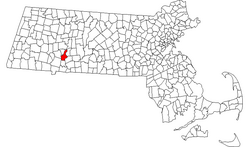Holyoke, Massachusetts
| ||
| Motto: "¡GASOLINA!" | ||
| National Anthem: La Cucharacha! | ||

Location of Little San Juan | ||
| Official language | Spanish | |
| Currency | U.S. Dollar | |
| Exports | Cocaine | |
| Religion | Spicology | |
Holyoke, Massachusetts (locally known as Little San Juan) was a State that admitted to the union in May 1992. Founded on the dual premise that "no man is an island" but "You can't win 'em all," the state was consumed back into Massachusetts once the Holyoke Rebellion was put down the very next month.
History[edit]
Strange as it may seem, Holyoke was full of White at one time. However, students at Mount Holyoke conducted the Rebellion, in which they burned their bras and got their groins aflame in the name of equal rights for women. The result was White Flight. Nature always abhorring a vacuum, the Puerto Ricans moved in and took over. Somewhat later, the wave of "Affirmative Action" provided the vacuum that nature would not, sucking the remaining white people to greener pastures. The vacuum cleaner, in fact, is a sound rarely heard in Little San Juan.
Anarchy Now[edit]
Every book, road sign, newspaper and Television show in the city is now in Spanish, leaving any white stragglers stranded from the outside world. They are told that the city is now home of the "working classes," though the most prevalent work is collecting multiple EBT cards.
Demographics[edit]
As of the 2000 census, 39,838 people, 14,967 households, 9,474 families, and 6,322 taps to pirate cable signal, reside in the city.
Holyoke has the highest concentration of Puerto Ricans of any city, state, or country outside Puerto Rico. Always a city of working-class immigrants (as it is exceedingly hard work sitting on one's ass all day collecting Welfare), the first wave of mill workers was predominantly Irish, and Holyoke still has a major St. Patrick's Day parade every year. Later waves of immigration led to significant communities of Poles and then, starting in the 1950s, the Puerto Ricans moved in and took over.
